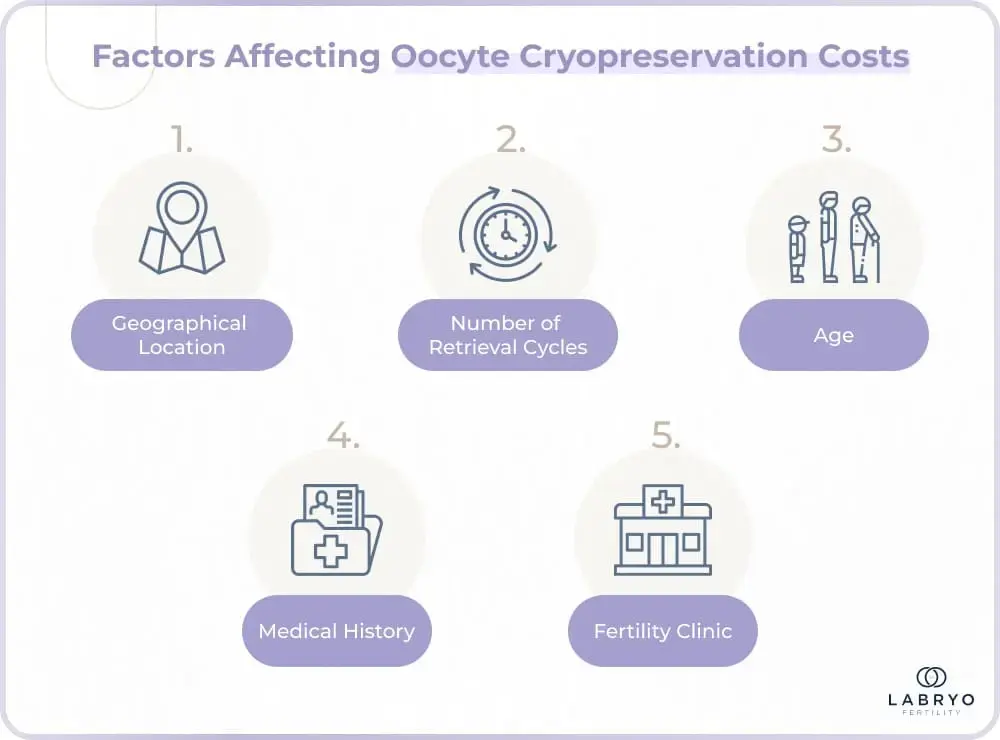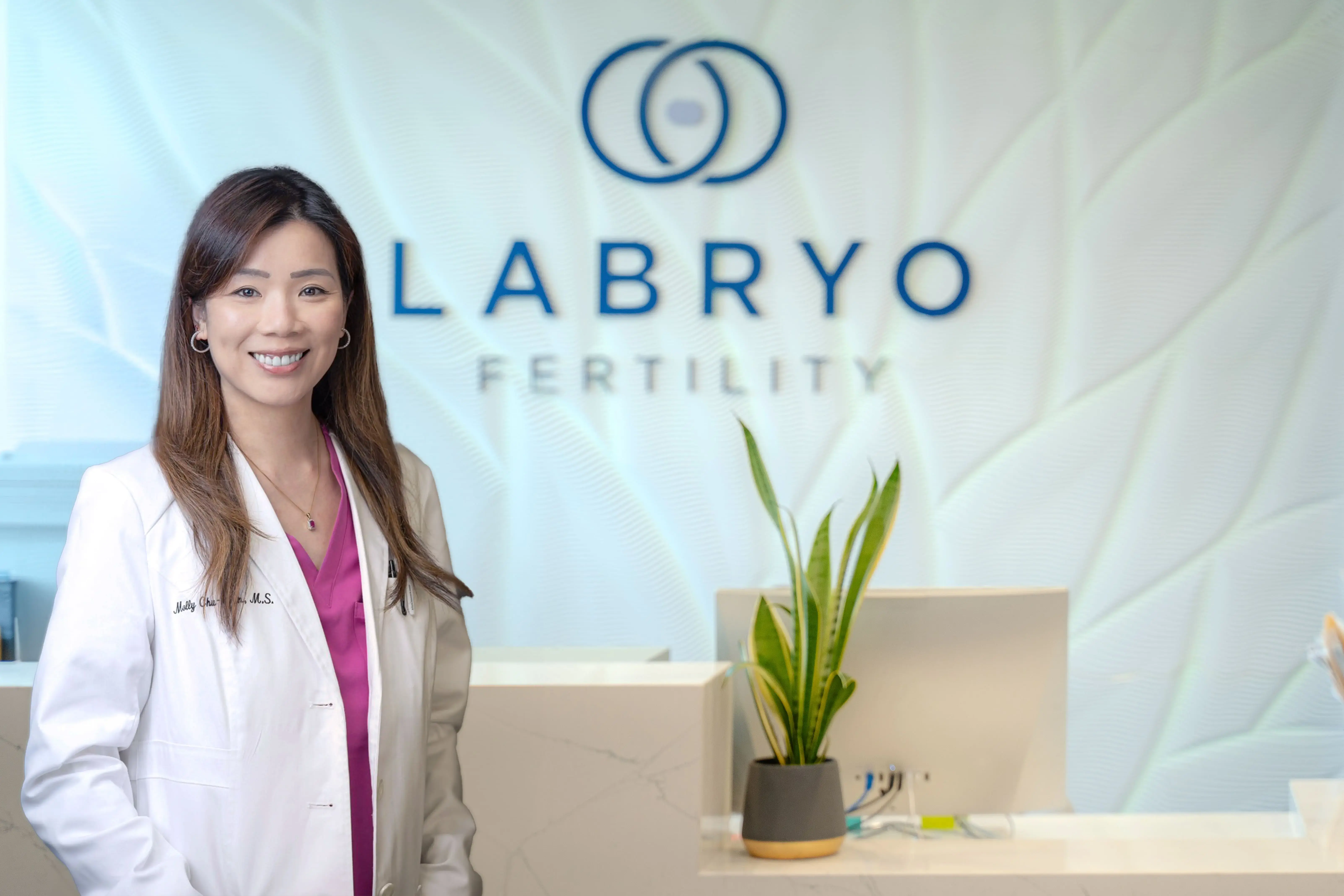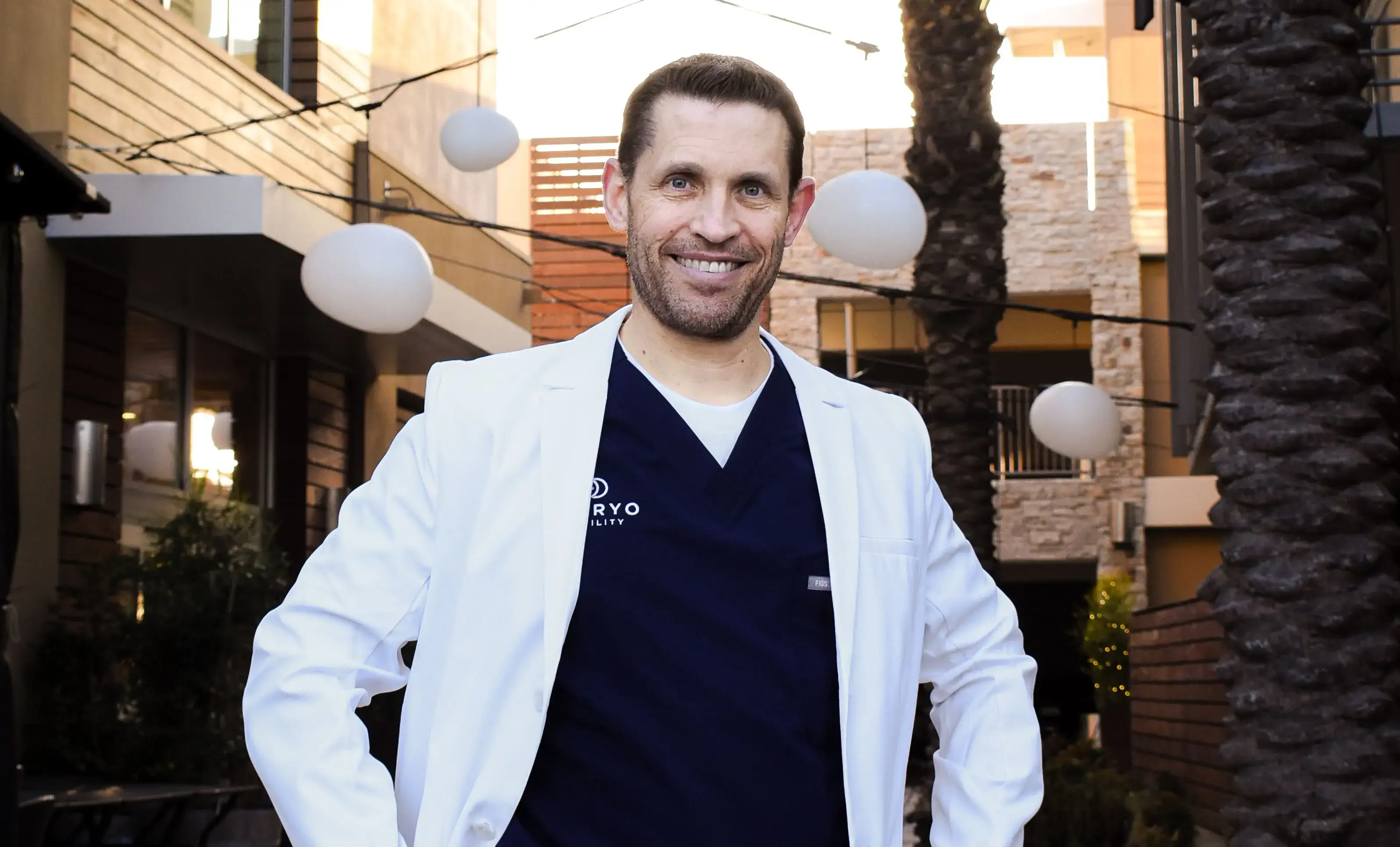Blogs
- Home
- Blogs
- Educational
- Oocyte Cryopreservation Costs Guide

Oocyte Cryopreservation Costs Guide
December 30, 2024Molly Chu Chen - Labryo Fertility
EducationalOocyte cryopreservation, commonly known as egg freezing, is a fertility preservation technique that involves extracting mature eggs from the ovaries and storing them with a process called vitrification.
Nonetheless, these are just estimates and you should always consult your fertility clinics to get a personalized quote based on your own treatment plan.



While this technique offers flexibility for family planning, anyone considering egg freezing should prepare
carefully as it is a life-changing decision that could have substantial emotional and financial impact. To help women make informed choices about their reproductive health and future family plans, this article will break down the costs associated with egg freezing in the United States, discussing the average ovum freezing costs, the factors that influence it, and available financing options.
1. How Much Does It Cost to Freeze Your Eggs on Average?
The average cost of freezing eggs in the U.S. ranges from $8,000 to $20,000 per cycle. This price typically covers essential fees for the initial consultations, fertility testing, hormone stimulation treatments, monitoring appointments, anesthesia, and the egg retrieval procedure.
However, ovum freezing costs can vary depending on several factors, including the geographical location of the fertility clinic. For instance, here's a comparison of average costs in a few major U.S. cities:
| City | Average Egg Freezing Costs (USD) |
| New York City |
$17,773 |
| New Jersey |
$17,550 |
| Chicago |
$16,666 |
| Atlanta |
$16,550 |
| San Francisco |
$15,600 |
| Seattle |
$15,137 |
| Los Angeles |
$14,850 |
| Boston |
$13,800 |
Source: FertilityIQ
Other factors, such as a patient’s individual medical condition, the number of cycles needed, and available financing or insurance options, can also significantly influence the final cost. We will delve deeper into these factors in later sections of this article.
To get a more accurate estimate of egg freezing costs, it’s important to consider your family-planning goals—such as the number of children you would like to have— and consult with a fertility specialist to determine the number of cycles you may need. By understanding your specific needs, you can obtain personalized quotes from different clinics to make the best choice based on your condition and budget.
2. A Breakdown of Oocyte Cryopreservation Costs & Process
Egg freezing involves multiple stages, each with its own associated costs. Here is a general overview of what to expect from the ovum freezing costs in the U.S.:
- Initial Consultation and Testing: $200–$3,000
- Ovarian Stimulation Medication: $2,000–$6,000 per cycle
- Ovarian Stimulation Monitoring: $200–$750 per cycle
- Egg Retrieval Procedure: $2,000–$10,000 per cycle
- Egg Freezing: $1,000–$3,000 per vitrification cycle
- Frozen Eggs Storage: $350–$1,500 annually
For a better understanding of the egg freezing process, the following sections provide more detail on each step, including how it works and what each fee typically covers.
2.1. Initial Consultation and Test Fees
During the initial consultation, the fertility specialist will assess the patient’s medical health history, overall condition, and ovarian reserve by performing physical exams and various fertility tests. The fertility specialist will also take this time to discuss the patient’s fertility goals. With this information, fertility specialists can develop a personalized treatment plan to maximize the chances of success in egg freezing.
In the U.S., initial consultations and test fees range from $200 to $3,000. This typically includes bloodwork, hormone level assessments, ultrasound imaging, and more, but the price can still vary due to the clinic's location, the specific tests required, health insurance coverage, etc.
2.2. Ovarian Stimulation Medication Fees
Hormone medications are essential for egg freezing, as they stimulate the ovaries to produce multiple eggs in a single cycle, increasing the chances of retrieving viable eggs.
These medications are typically started on the 2nd or 3rd day of the menstrual cycle and are taken daily for about 8 to 10 days. There are two types of ovarian stimulation medications:
- Injectable Medications: The most common option. They are self-administered 1 to 2 times per day with a small needle injected into the lower abdomen or thigh.
- Oral Medications: They may be used alone or in combination with injections. Patients typically have to take 1 pill per day as instructed by their fertility specialist.
The medication for ovarian stimulation usually costs between $2,000 to $6,000 per cycle in the U.S. It varies based on the patient’s unique protocol, the dosage required, and the brand of medication prescribed. For instance, injectable medications like Gonadotropins (e.g., Follistim, Gonal-F) tend to be more expensive, while oral medications like Clomiphene citrate (Clomid) and Letrozole (Femara) often cost less.
2.3. Monitoring Fees
Throughout the ovarian stimulation phase, the fertility clinic will schedule regular blood tests and ultrasounds to monitor the patient's response to hormone medications over the course of 1-2 weeks. These tests help evaluate hormone levels and track the growth and development of follicles, ensuring the timing is optimal for egg retrieval.
Monitoring fees vary by clinic but generally range from $200 to $750 per cycle in the U.S. The frequency of these tests and the clinic’s location can also influence the total expense, so patients must confirm the treatment schedule to understand the cost requirements.
2.4. Egg Retrieval Fees
The egg retrieval cost in the U.S. typically ranges from $2,000 to $10,000 based on the clinic’s location, anesthesia type, and the number of eggs retrieved.
It involves a transnational ultrasound probe to locate the ovaries and eggs, and using a thin needle through the vaginal wall to collect the mature eggs from the ovaries. A vacuum pump is attached to the needle to gently suction the fluid containing eggs from follicles. Performed under anesthesia, the procedure is generally safe, though potential risks include ovarian hyperstimulation syndrome (OHSS), infection, bleeding, or, in rare cases, damage to the ovaries. Nonetheless, these risks are minimal, and the fertility clinics are equipped to provide immediate medical care if complications arise.
2.5. Egg Freezing and Storage Fees
After retrieval, the eggs will be frozen using a rapid-freezing process called vitrification. This ensures the long-term preservation of eggs without compromising their quality, regardless of how long they remain frozen, as it prevents the formation of ice crystals that could damage the egg cells. Once frozen, the eggs will be stored in liquid nitrogen tanks at the fertility clinic’s lab, in preparation for future use.
For those wondering how much does it cost to freeze and store eggs in the U.S., the cost of vitrification often ranges from $1,000 to $3,000 per cycle, depending on the number of eggs frozen. Storage fees are separate and generally range from $350 to $1,500 annually, as seen in the data from FertilityIQ. It is important to check with your own fertility clinic for specific pricing and storage duration options.
2.6. Examples of Estimated Oocyte Cryopreservation Costs Total
| Age at Storage | 25 | 30 | 38 |
| No. of Retrieval Cycles |
1 | 1 | 3 |
| Medication and Egg Retrieval Cost |
$15,000 |
$15,000 |
$45,000 |
| Years of Storage |
15 | 10 | 2 |
| Storage Cost |
$15,000 |
$10,000 |
$2,000 |
| Total Estimated Cost |
$30,000 |
$25,000 |
$47,000 |
To further demonstrate how ovum freezing costs can vary, here's a comparison of estimated expenses for women freezing their eggs at different ages, assuming they plan to store their eggs until age 40 and incur an annual storage fee of approximately $1,000.
As you can see, while younger women may need longer storage periods, their higher likelihood of success often results in fewer retrieval cycles, lowering overall costs. Conversely, older women might have shorter storage needs but typically require more retrieval cycles to achieve a viable number of eggs, leading to a significantly higher upfront investment in the procedure itself.
3. Additional Costs: Using Frozen Eggs in IVF
When the patient is ready for pregnancy, frozen eggs can be used in the In Vitro Fertilization (IVF) process. This involves three key steps: egg thawing, fertilization, and embryo transfer.
The thawing process is crucial to ensure the eggs remain viable, and fertilization is often achieved through Intracytoplasmic Sperm Injection (ICSI), which involves injecting a single sperm into each egg. There is also an optional procedure called PICSI, which can be used to select the healthiest sperm. The sperm can either be from an intended parent or a donor.
Some patients may opt for Preimplantation Genetic Testing (PGT) to identify if the resulting embryos produced are genetically normal. Additionally, medications will be necessary to prepare the uterus for implantation by thickening the uterine lining. Once the uterus and embryo are ready, the embryo transfer procedure will be conducted in the facility without anesthesia.
With this in mind, here is a breakdown of the associated costs:
- ICSI Fees: $1,000 to $2,800
- PICSI Fees (optional): additional $250 to $350 along with ICSI costs
- Medication Fees: $300 to $1,500 per cycle
- Embryo Transfer Fees: $3,000 to $6,500 per cycle
- Donor Sperm (if applicable): $400 to $2,000 per vial, depending on the source
- PGT (optional): $300 to $12,000 per embryo, depending on the type of tests and number of embryos tested
Altogether, the total cost for a single IVF cycle using frozen eggs can range from approximately $8,000 to over $20,000, whether optional services like PGT or donor sperm are used.
It is also important to note that, similar to egg freezing, the cost of IVF with frozen eggs can vary due to clinic location, procedure options, the number of cycles required, etc. Hence, consulting with a fertility clinic for personalized quotes is essential to understanding the full financial picture.
4. What are the Factors Affecting Oocyte Cryopreservation Costs?
As we’ve mentioned earlier, the costs of egg freezing are influenced by various factors. In this part, we will elaborate on each of these factors to help understand them further.

4.1. Geographical Location
Fertility services in major cities may cost more than those in smaller cities. These price differences are usually due to varying operating expenses, regional demand, and local competition.
4.2. Number of Retrieval Cycles Required
Multiple cycles may be required to obtain a sufficient number of high-quality eggs, especially for women with lower ovarian reserves or those who have had previous unsuccessful cycles. This can significantly increase the overall cost of the procedure.
4.3. Age
As women age, their ovarian reserve declines, leading to fewer eggs retrieved, reduced egg quality, and lower success rates per cycle. This often results in the need for higher medication dosages and additional retrieval cycles, both of which drive up costs.
For example, in the European Society of Human Reproduction and Embryology’s study developed from over 500 IVF cycles, researchers found that with 20 mature oocytes frozen:
- A 28-year-old would have a 94% chance of at least one live birth.
- A 34-year-old would have a 90% chance of at least one live birth.
- A 37-year-old would have a 75% chance of at least one live birth.
- A 42-year-old would have only a 37% chance of at least one live birth.
The number of mature eggs required to reach the same probability of success also increases with age. To achieve a 75% likelihood of at least one live birth, a woman would need to freeze:
- 10 mature eggs at age 34
- 20 mature eggs at age 37
- 61 mature eggs at age 42
These figures underscore the age-related outcomes in fertility and highlight why egg freezing at a younger age is often recommended to maximize success rates.
4.4. Medical History
Those with pre-existing conditions or fertility issues, such as polycystic ovary syndrome (PCOS) or endometriosis, may need specialized care or additional medications, raising the total cost.
4.5. Fertility Clinic Choice
The choice of a fertility clinic can significantly impact the cost, as it depends on the clinic’s reputation, quality of care, staffing, equipment, and medication protocols.
While clinics with more advanced facilities may charge premium prices, they usually deliver higher success rates, so patients should weigh the benefits these clinics can offer before disregarding them due to financial considerations.
5. Are the Costs of Freezing Eggs Covered by Insurance?
Whether your health insurance covers the cost of egg freezing depends on several factors, including your specific health plan and state laws.
5.1. Elective vs. Medically Indicated Egg Freezing
When considering the viability of egg-freezing insurance coverage, the insurers will have to know whether this procedure is elective or medically indicated:
- Elective Egg Freezing: This is when a woman chooses to freeze her eggs for personal reasons, such as delaying childbearing or career advancement. Most of the time, elective egg freezing is not covered by insurance.
- Medically Indicated Egg Freezing: This is when a woman freezes her eggs due to a medical condition that could impair her fertility, such as cancer treatment. In such cases, some insurance plans are more likely to cover the costs, as they are deemed medically necessary.
5.2. Insurance Coverage Options
Some employer benefits also help cover the cost of freezing eggs with insurance, particularly through fertility benefits programs offered by networks like Progyny or Carrot Fertility. These programs are becoming more common as employers recognize the value of providing fertility preservation services.
Moreover, some state-mandated coverage exists for medically required fertility preservation. For example, states like California, Connecticut, Delaware, Illinois, Maryland, New Hampshire, New Jersey, New York, and Rhode Island have laws or pending laws requiring insurance providers to cover fertility preservation services when medically necessary. You can also check out the National Infertility Association website to see the latest information on fertility insurance coverage by state.
Whether you are considering insurance coverage through employer benefits or state-mandated healthcare, it is essential to confirm with your insurance provider or HR department to understand what is covered and if there are any restrictions or co-pays associated with egg freezing.
6. How to Pay for Egg Freezing: Additional Financing Options
Other than insurance, some clinics may offer financing options that can help you manage the costs of egg freezing. Here are some common examples:
- In-House Financing: Many fertility clinics offer in-house financing plans, including installment plans, discounted packages, or fertility loans, especially for medically indicated treatments. These plans can make it easier to spread out the cost of treatment over time.
- Flexible Spending Accounts (FSAs) and Health Savings Accounts (HSAs): If you have an FSA or HSA, you can use pre-tax dollars to pay for qualified medical expenses, including fertility treatments.
- Credit Cards: Using a credit card with rewards or cash-back offers can help you earn rewards on your egg-freezing expenses. However, it's important to manage your credit card debt responsibly and pay off your balance in full each month.
- Crowdfunding: Platforms like GoFundMe and Gift of Parenthood allow you to raise funds from friends, family, and the broader community to help cover the cost of treatment.
- Fertility Grants: The National Infertility Association offers a list of grants and financial assistance programs for individuals struggling with infertility.
- Shared Donor Programs: Programs like Freeze and Share and Cofertility allow you to donate your frozen eggs to others in exchange for discounted rates on your own egg-freezing costs.
By exploring these financing options and carefully budgeting, you can make egg freezing a more affordable reality.
7. Affordable Egg Freezing Services at Labryo Fertility Center
As an esteemed egg-freezing clinic, Labryo Fertility Center combines advanced treatments with personalized care to help patients preserve their fertility for the future. Understanding the financial concerns that often accompany egg freezing, we also provide a range of financing options designed to ease the financial burden:
- Value Packages: Patients can leverage our discounted treatment packages, which include essential services like ultrasound-guided egg retrieval, sperm preparation, and cryopreservation starting at $6,800 (for 15 oocytes per retrieval cycle).
- Fertility Loans: We offer personal loans with flexible monthly installment plans through our partnership with Future Family. These loans ensure that the cost of freezing eggs is manageable, with low interest rates and no prepayment penalties.
On top of that, Labryo Fertility Center stands out for our transparent pricing terms, so patients can plan ahead without worrying about unexpected costs. Whether you’re looking for a one-time cycle or a comprehensive egg banking plan, Labryo ensures clarity and support throughout the process. Visit our website to start your journey today.
8. FAQs About Egg Freezing
Q1. Why should I consider egg freezing?
Egg freezing offers women the opportunity to preserve their fertility for future family planning, and it can be a valuable option for a variety of reasons. One of the key reasons women consider freezing their eggs is to plan around personal or professional goals. Many women may not be ready to have children due to career ambitions, education, or simply waiting for the right partner. Freezing eggs provides the flexibility to pursue these goals while keeping the option of having children later in life open.
Additionally, medical conditions such as early menopause, autoimmune diseases, or endometriosis can affect fertility by reducing the number and quality of eggs. Chemotherapy or other cancer treatments can also damage ovarian function, making egg freezing an important step for preserving fertility before undergoing such procedures.
Q2. At what age should I freeze my eggs?
The recommended age for egg freezing is generally around the late 20s or early 30s. At this age, the eggs are typically of higher quality so they have a better chance of successful fertilization and implantation. It is also usually around this age when people might start thinking about family planning and potentially have the financial means to freeze their eggs.
However, if you have a medical condition that may affect your fertility, such as cancer, it's advisable to consider egg freezing sooner rather than later. Patients planning to undergo gender-affirming surgery or hormone therapy can also consider egg-freezing procedures earlier to preserve fertility.
Q3. How many eggs should I freeze?
The number of eggs you should freeze depends on several factors, including your age and desired family size. Generally, it's recommended to freeze 10-15 eggs per planned pregnancy (e.g. 10-15 eggs for one pregnancy, 20-30 for two, and vice versa.) For women over 37, aiming for 25-30 eggs per pregnancy may be more appropriate due to the natural decline in egg quality and quantity with age.
Still, it's important to note that the number of eggs you can successfully freeze may vary, as it depends on various factors, such as your ovarian response to stimulation, egg quality, and the success of the freezing and thawing process. In some cases, you may not have control over the exact number of eggs you can retrieve but your fertility clinic will help guide you on what’s achievable.
Q4. Does making embryos from frozen eggs affect quality?
According to studies by the American Society for Reproductive Medicine, the quality of embryos created from frozen eggs is similar to those created from fresh eggs due to the advances in egg-freezing technology and medical protocols.
Q5. Will the egg retrieval procedure hurt?
The level of discomfort during egg freezing varies from person to person. Some individuals may experience mild period-like cramping or bloating during the hormonal stimulation process as the ovaries produce multiple eggs. However, advancements in fertility treatments have significantly reduced the risk of severe side effects.
The egg retrieval itself is a minor outpatient procedure typically done under sedation, so you won’t feel pain during the process. Afterward, most patients experience only mild discomfort, and you’ll usually be observed for a couple of hours in case of any pain or discomfort before being discharged on the same day.
Q6. Can I freeze my eggs if I have polycystic ovary syndrome (PCOS)?
Yes, it is possible to freeze eggs if you have polycystic ovary syndrome (PCOS), but patients with PCOS may need to consider freezing a larger number of eggs, as the quality of the eggs can be lower compared to others.
It’s also important to inform your fertility doctor in advance, as individuals with PCOS are at a higher risk of ovarian overstimulation, which can lead to increased discomfort or complications. By knowing ahead of time, your doctor can adjust the treatment plan to minimize these risks and ensure the best possible outcome for egg freezing.
Q7. Can I freeze embryos instead of eggs? How much does it cost to freeze embryos?
Yes, you can freeze embryos instead of eggs. This can be particularly beneficial if you want to evaluate the genetic makeup of the embryos and avoid potential gene disorders.
However, the downside is if you are a single female, you’ll have to make an embryo using a sperm donor. Hence, you might not be able to use these eggs to create embryos with a future potential partner.
Also, note that embryo freezing is generally more expensive than egg freezing, as it involves additional procedures such as fertilization and embryo testing. The cost of embryo freezing can range from $15,000 to $35,000 per cycle, plus annual storage fees of $350 to $1,500.
Ultimately, the decision to freeze eggs or embryos depends on your individual circumstances and goals. Thus, it's essential to discuss your options with a fertility specialist to determine the best approach for you.
Q8. Where are the frozen eggs/embryos stored?
After the freezing process (vitrification), frozen eggs/embryos are placed in vials and then stored in secure cryogenic tanks filled with liquid nitrogen at the fertility clinic’s laboratory. These tanks maintain a temperature of around -321°F (-196°C), which preserves the cells in a suspended state for long-term storage.
Throughout the storage period, clinics follow strict protocols and monitor them regularly, ensuring the safety and viability of the frozen eggs/embryos until you're ready to use it.
Resource for Egg Freezing Costs from Our Experts
At Labryo Fertility Center, we believe transparency is key to our patient’s peace of mind. Hence, this article on egg freezing costs features insights from our experts, Molly Chu-Chen and Dr. Jeremy A. King.
Molly Chu-Chen, M.S., M.H.A., TS (ABB) - Chief Embryologist & Founder

With more than 20 years of hands-on experience, Molly Chu-Chen has helped countless women preserve their fertility through advanced oocyte cryopreservation techniques. Her career has spanned elite hospitals in the U.S. and Asia, and she is certified by the American Board of Bioanalysis. As Labryo's Chief Embryologist and founder, she even personally oversees egg vitrification processes, maintaining optimal survival rates and high-quality outcomes.
Dr. Jeremy A. King, M.D. - Director of IVF

With board certification in both OB/GYN and Reproductive Endocrinology, Dr. Jeremy King brings clinical excellence to Labryo Fertility Center’s egg freezing program through training from Johns Hopkins, as well as a rich background in academic and military IVF programs. He offers transparent counseling on the costs, benefits, and timing of oocyte cryopreservation. Under his care, patients receive personalized treatment plans grounded in the latest clinical evidence to preserve their reproductive potential for the future.

